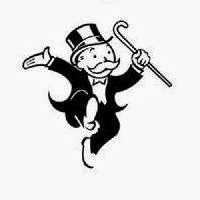To continue my research for this blog, I decided to read "A Little History of Economics" by Niall Kishtainy ( Niall Kishtainy's Website ) to see if it made me change my mind about the contents of this blog.
Like all the books that I have read so far in the "Little Histories" series, it is absolutely excellent.
I admit that I wrote this blog without ever having made any kind of formal study of economics.
The observations I make in this blog come from a rather intuitive use of pure reason.
After reading the book, I stand by what I originally wrote wholeheartedly and in its entirety, and regard it as the product of common sense and as being rational and coherent.
Whilst the book does not really diverge from a conventional view of Economics, that fact that it is a history of economics makes it very clear how much politics is involved in it. Though this is never explicitly stated.
The book repeats the confusing canard about "scarcity" making the study of Economics emerge, since resources are scarce and wants are infinite.
Gandhi's obervation has always been true, however - no matter what the historical era - and it always will be true - "there is enough for everyone's need but not enough for everyone's greed."
We are now supposedly living in a "post-scarcity" economic situation - in which the problem of scarcity has disappeared. This is undoubtedly true. But whether resources have always been scarce is debatable.
And it has always obviously been the case that the way resources are distributed is inevitably determined by politics!
Economics is about value, and value is always and inevitably to some extent a political quality and to some extent a politically-determined quality.
Economics is indeed politics.
I long for more people to point out this truth and work through its many implications.
The book "A Little History of Economics" stresses the variety of economic thought and is very open to alternative views of economics. It is a very good summary of economic thought and a call to broaden what goes by the name of economics. It is - as I say - an excellent little book.
Like all the books that I have read so far in the "Little Histories" series, it is absolutely excellent.
I admit that I wrote this blog without ever having made any kind of formal study of economics.
The observations I make in this blog come from a rather intuitive use of pure reason.
After reading the book, I stand by what I originally wrote wholeheartedly and in its entirety, and regard it as the product of common sense and as being rational and coherent.
Whilst the book does not really diverge from a conventional view of Economics, that fact that it is a history of economics makes it very clear how much politics is involved in it. Though this is never explicitly stated.
The book repeats the confusing canard about "scarcity" making the study of Economics emerge, since resources are scarce and wants are infinite.
Gandhi's obervation has always been true, however - no matter what the historical era - and it always will be true - "there is enough for everyone's need but not enough for everyone's greed."
We are now supposedly living in a "post-scarcity" economic situation - in which the problem of scarcity has disappeared. This is undoubtedly true. But whether resources have always been scarce is debatable.
And it has always obviously been the case that the way resources are distributed is inevitably determined by politics!
Economics is about value, and value is always and inevitably to some extent a political quality and to some extent a politically-determined quality.
Economics is indeed politics.
I long for more people to point out this truth and work through its many implications.
The book "A Little History of Economics" stresses the variety of economic thought and is very open to alternative views of economics. It is a very good summary of economic thought and a call to broaden what goes by the name of economics. It is - as I say - an excellent little book.




